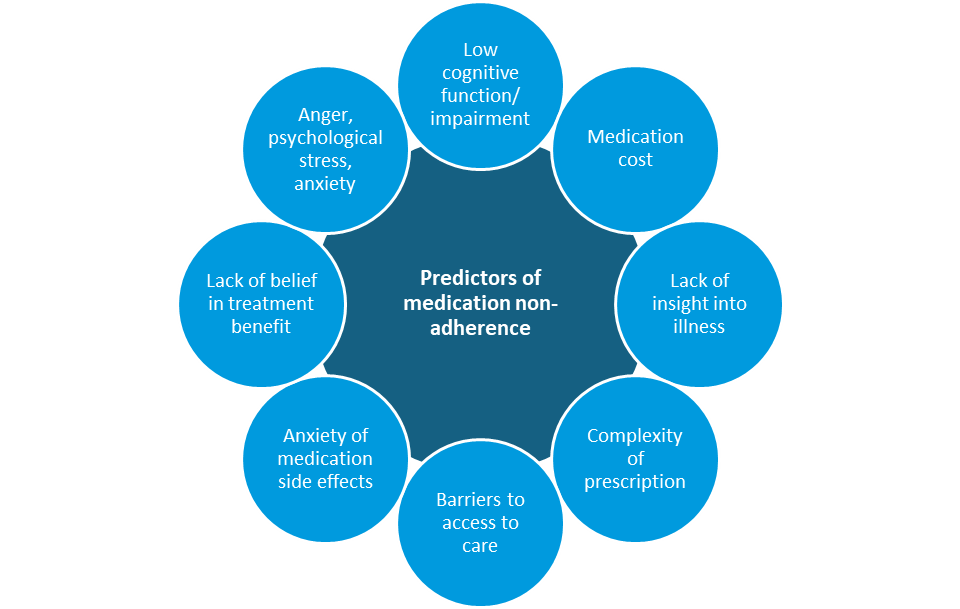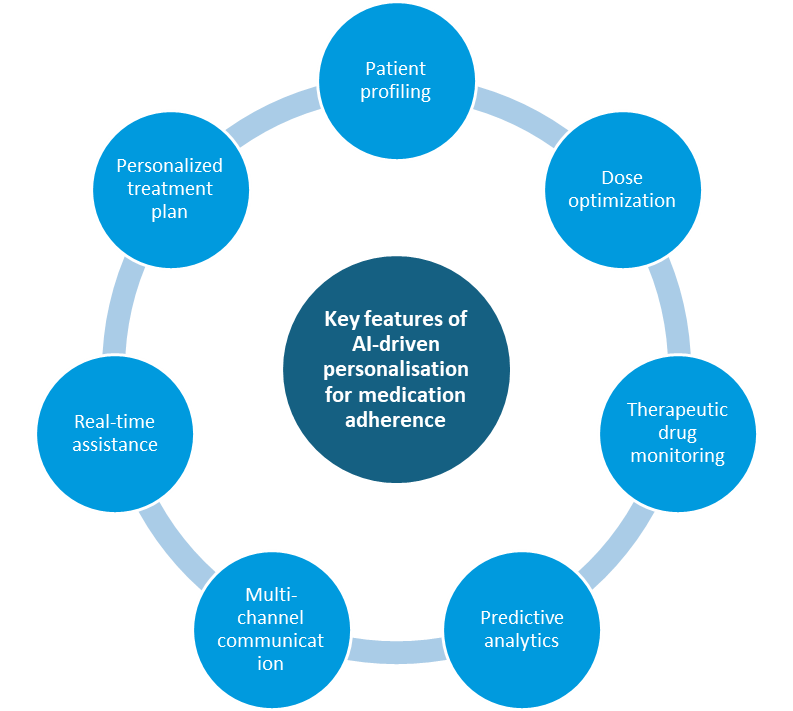Enhancing medication adherence with AI-driven personalization
- Artificial intelligence (AI) is revolutionizing healthcare, offering significant enhancements to patient care, clinical decision-making, administrative tasks, and the delivery of healthcare services1.
- Non-adherence to medication is a recognized public health concern, affecting treatment outcome as well as overall healthcare cost2.
- AI can help improve medication non-adherence by providing personalised reminders, monitoring patient behavior, and offering tailored interventions to address underlying factors contributing to non-adherence3.
Understanding medication non-adherence: A barrier to health outcomes
Non-adherence to medication remains a huge barrier to achieve most favourable outcomes from prescribed treatment, especially in long-term conditions4. In 2018, a report by the Organisation for Economic Co-operation and Development (OECD) revealed that failure to adhere to medical advice led to approximately 200,000 premature deaths annually in Europe5. The high health and economic costs of non-adherence to medication is a significant issue for both society and the economy, signifying a fault trace in medicine4.
- How severe is non-adherence to medicine?
Just picture having a key that unlocks the door to improved health, yet you’ve chosen not to use it. The same happens when patients do not take their medication as prescribed. As per the WHO reports, 50% of the patients do not take their medication as prescribed2. Diabetes medicine, for example, when used appropriately, can prevent blindness, end-stage renal disease, non traumatic limb amputation, the risk of cardiac, peripheral, and cerebral vascular disease, and death in neonates. However, according to a recent study, 34% of the individuals were non-adherent to medicine. This not only puts their overall health at risk, also leads to increased healthcare costs6. - Factors contributing to non-adherence
Depending on the individual’s level of education, disease condition, and complexity in the prescription, non-adherence is attributed to many factors2.
Some of the predictors of medication non-adherence are explained in Figure 1.

Figure 1: Predictors of medication non-adherence.(This figure was adapted from Alijofan M, et al. 2023)2
To read more about barriers with medication adherence please read: Overcoming barriers to medication adherence: a comprehensive guide
The role of AI in personalizing patient care
By leveraging the power of artificial intelligence, medical decision could be supported as AI can gather, analyze, and act on patient data in real time, leading to better health outcomes. By processing large amounts of patient data from various sources, such as electronic health records7, and wearables8 AI algorithms can gain insights into patient behavior, preferences, and outcomes, which can be used to develop more effective treatments plans and interventions that are tailored to the needs of individual patients. AI can also contribute to enhance patient safety by lowering the likelihood of errors and adverse outcomes such as misdiagnosis or delayed treatment7.
- How AI understands patient need
Let’s understand how AI can analyse and integrate data for each individual to give tailored care. Suppose you wear a smartwatch that can keep track of your steps, sleep cycle, heart rate, etc9. AI can analyse these data to give prompt to live healthier just like a health coach you assign for yourself. - Customising interventions with AI
Customised intervention using AI might predict patient outcomes and optimize resource utilization in healthcare systems7. Among various factors of non-adherence,forgetfulness is one of reasons10. This is one example where the AI technology is suitable. It can analyze your behavior patterns and determine what is the most effective way to influence you. For example, if you read your messages immediately after waking up, AI will notice this habit and can begin to daily share a few personalized reminders and motivation to start your day in a good mood.
To know more about pill reminders please read: Pill reminders: Addressing non-adherence owing to forgetfulness
Key features of AI-driven personalization for medication adherence
AI-driven personalization for adherence to medication entails using AI technologies to personalize medication adherence strategies for specific patients. Some of the features are mentioned in the figure:

Figure 2: Key features of AI-driven personalization. (This figure was created for illustrative purposes and is based on data obtained from Alowais SA, et al. 2023)7
AI algorithms can analyze a multitude of data sources, encompassing demographics, medical histories, socioeconomic factors, lifestyles, and behavioral patterns, to craft comprehensive profiles for personalized treatment plans tailored to each patient. AI-powered technologies offer real-time assistance in diagnosis and treatment decision-making. Multi-channel communication facilitates patients’ understanding of their conditions, available treatment options, and self-care instructions. Predictive analytics enhance the precision, efficiency, and cost-effectiveness of disease detection and laboratory testing procedures7.
To read more about personalised role of AI in healthcare please read our previous article: The role of AI in personalized health coaching for adherence
Real-world applications: AI in action
In real-world application, some of the novel and cutting-edge technology of AI tools are revolutionizing the healthcare sector and helping medical practitioners.
Below are some examples showcasing the implementation of these technologies:
- Chatbot: Researchers found that ChatGPT, an AI Chatbot founded by OpenAI, can help patients with diabetes understand their diagnosis, treatment options, monitor their symptoms, adherence to medications, provide feedback, encouragement, and answer their questions11. AI can also be implemented to rewrite patient education materials into certain reading levels. This way AI can empower patients understanding towards their health by ensuring that patients can understand their diagnosis, treatment options, and self-care instructions7
- Reminder: A great example is Medisafe app. This application doesn’t just send reminders; it also keeps track of how the patient is doing and shares the information to healthcare provider. Hartch et al., in 2023 in a clinical trial investigated the effect of medication adherence app in medically underserved patients with chronic illness. A significant improvement in medication adherence (Cohen’s d = -0.52, p = .014) was reported in the intervention group with medication self-efficacy (Cohen’s d = 0.43, p = .035)12.
- AI-driven Nudge intervention: Another interesting approach, AI-driven nudge intervention with stakeholders was codeveloped to improve medication adherence. In a human-centered design approach Sumner J, et al., in 2024 conducted 20 interviews with healthcare professionals and patients. Reminders and remote contact from healthcare providers were identified as the two most effective interventions. Also, as per the findings an AI-driven nudge tool was found an acceptable and appropriate solution, assuming it is flexible as per the user requirements13.
Integrating AI tools with healthcare systems
Integrating AI technologies into healthcare systems entails utilizing artificially intelligent programs to assist doctors and nurses in better caring for patients. Collaboration with AI allows healthcare systems to provide more tailored care and improve people’s health. Some of the key area where AI is used are1:
- Medical diagnosis: AI can help detect early signs of breast cancer in mammograms or identify abnormalities in X-rays and CT scans analysing massive amounts of medical data.
- Personalized treatment plans: AI can analyse individuals’ health data, including personal information, medical history, and lifestyle factors to personalised treatment plans
- Virtual health assistant: AI can provide real-time health information with patients, schedule appointments, and response to any questions about medications, symptoms, and lifestyle recommendations.
- Predictive analytics: AI can assist in identifying people who are susceptible to long-term conditions like diabetes or cardiovascular disease, allowing for early intervention to either avoid or better treat these conditions.
- Drug discovery and development: AI can step up the drug discovery process and its development by analysing myriads of biomedical data to identify potential drug candidates. It can predict the efficacy and toxicity, as well as optimize their chemical structure.
- Remote monitoring of patients: By analysing vital signs, daily activity levels and medication adherence, AI can help sense early warning signs and provide timely interventions and improve patient care.
- Health administration: AI can simplify administrative work such as appointments, patient admissions, co-payment from patients.
Measuring the impact: benefits and cost savings of enhanced medication adherence
Studies have shown that improving medication adherence can lead to significant benefits for patients and cost savings for healthcare systems. For instance, A study measuring the impact of a financial incentive and refill reminder initiative on medication adherence resulted in enhanced adherence to antithrombotic medicines, reduced emergency department use, and higher prescription costs, with no difference in total pharmacy, healthcare, or total cost of care14.
- Indirect cost savings for healthcare systems
It has also been highlighted that improved adherence could reduce both direct (healthcare cost) and indirect cost (societal cost), by decreasing the rate of hospitalization, more productive workdays, which can be attributed as an increased quality of life15.
Economic considerations: the cost of AI implementation vs. healthcare savings
The economic influence of AI on healthcare is substantial as healthcare expenses continue to rise globally. Understanding the full spectrum of costs and benefits linked to integrating AI systems is essential for optimizing the allocation of healthcare resources16. AI reduces healthcare service costs when compared to routine methods by reducing time, eliminating human errors, providing diagnostic accuracy which further reduces likelihood of inaccurate examination17.
- Investment in AI technology: upfront costs and long-term benefits
AI-powered systems can greatly reduce inefficiencies such as spending on avoidable and correctable system flaws, substandard vigilance delivery, overtreatment, and poor health care delivery, resulting in a significantly more efficient and cost-effective health ecosystem. Saving time in diagnosis and treatment procedures, tailored treatment for each patient to avoid post-treatment complications, and speeding up the development of life-saving drugs all result in a direct savings on costs. Implementing AI technology in health care can not only cut expenses but also help firms maximize their return on investment (ROI). However, the long-term benefits of AI may outweigh these upfront expenses17. - Analysing the return on investment (ROI) for healthcare providers
AI examines and analyses myriad of data to determine appropriate treatments to produce the best outcomes17. Investing in AI might cost a lot at first, but it can lead to significant savings later by making services more efficient and improving patient care. So, even though it’s expensive at first, it pays off over time.
The future of AI and patient care: what’s next?
The future of AI in patient care is promising, with continued enhancements that can offer more innovative, time saving, and cost-effective solutions. AI can help in many parts of healthcare, like diagnosing illnesses, looking at genetic information to understand disease risks better7, as well as robots assisting in surgeries for greater precision.
Emerging trends and potential applications of AI in healthcare that might shape patient outcomes and the overall delivery of healthcare services18:
- Personalized healthcare applications: By analysing genetic and lifestyle information AI might focus for personalised medicine, using AI tools sleep disorders could be prioritised, and using predictive analysis the ageing process could be either slowed down or reversed.
- Enhanced treatment techniques: Treatment methodologies can be enhanced that include drug discovery and development, advanced robotic surgery, rehabilitation, AI hardware accelerators, AI-enhanced medical imaging, integrating AI with internet of things (IoT) and wearable technologies.
- Healthcare system optimisation: To guide future research, healthcare system optimization should be emphasized by enhancing patient outcomes and system efficiency where early diagnosis, customised treatment could lead to improved outcome and reduce fatality. Also, the global health monitoring system could be of great benefit.
- Data management: Recognizing the critical role of data management by addressing data scarcity in case of rare disease could be addressed by semi/weekly supervised learning techniques.
- Ethical considerations and building trust: These involves ensuring privacy of individuals data, stakeholder acceptance, trust building with explainable AI.
There are certain challenges in terms of regulation, ethics, and integration; however, the potential benefits of AI are immense. AI technology has the potential to completely transform healthcare by becoming more customized, effective, and receptive to the needs of the global population as it advances.
Conclusion
AI in healthcare not only personalizes interventions but also contributes to enhancing medication adherence through reminders, monitoring, and tailored support, ultimately improving patient wellness outcomes. AI has shown its game-changing potential across various domains in healthcare. Its impact extends to reducing healthcare expenses and enhancing the overall quality of life. Looking ahead, AI holds immense potential in advancing drug development, addressing global health challenges, and facilitating personalized treatment. By harnessing AI technologies, healthcare delivery stands to become more efficient, patient-focused, and driven by data.
“Life can only be understood backwards; but it must be lived forwards.”
― Eric Topol













